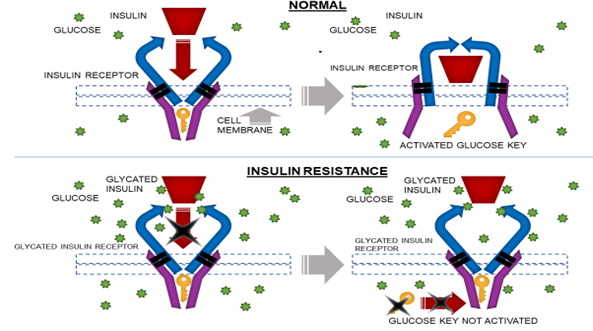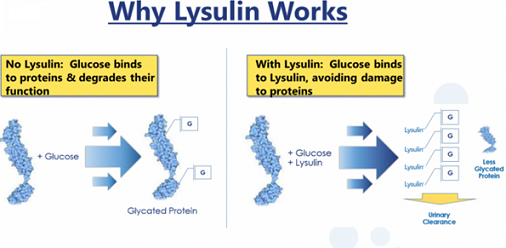Review Article :
Pharmacists can be part of the healthcare team
to help people with diabetes and prediabetes to better health. Obesity and type
2 diabetes are a worldwide epidemic and a problem that can be helped
dramatically with lifestyle changes (diet and exercise) combined with treatment
with drugs and supplements. Lysulin is a patent-pending nutritional supplement
that contains lysine, zinc and vitamin C and has been shown in double blind
placebo controlled studies to help people with prediabetes and type 2 diabetes
to better glycemic control and lower their HbA1c. The pharmacist needs to be
aware of this breakthrough and inform his customers of the availability of this
new product for improving their health. In addition, HbA1c testing at the
pharmacy or at home can be very useful in helping people with diabetes know how
well their diabetes management program is working. Glucose is essential in providing the human body
its’ energy needs. Glucose relies upon
the hormone, insulin, to enter our cells thereby producing the energy we need
for everyday living. However, while everyone needs a certain amount of glucose
for daily energy production, excessive glucose is dangerously toxic to the body
(primarily as a result of protein glycation). In addition, fructose (from High
Fructose Corn Syrup) does not utilize insulin
to enter the liver or our cells, and thus enters them easily and immediately
turns into fat [1-6]. Poor diet and
the consumption of High Fructose Corn Syrup (HFCS) lead to the obesity
and diabetes that we see all around us today. The pandemic of type 2 diabetes –
expected to affect at least 250 million people worldwide by 2020 and 642
million by 2040 [1] - is the result of our excessive carbohydrate, High
Fructose Corn Syrup and sugar-infused diet (and the lack of commensurate
exercise). This leads to insulin resistance, caused by the glycation of insulin
and insulin receptors [7], thereby resulting in high concentrations of glucose
in the bloodstream. The therapy for type 2 diabetes starts with attempts
to control glucose through diet and exercise. If this fails, oral drugs are
prescribed. If oral
drugs do not work, insulin injections are used. Over 30% of people with
type 2 diabetes are using insulin injections to control their blood Glucose levels [8]. There is a vast literature
documenting the role of nutraceuticals in the management of alterations in
metabolism [9] Protein
glycation AGEs are believed to be responsible for many (and
perhaps all) of the disease complications associated with diabetes. These
include retinopathy, nephropathy and neuropathy (which lead to blindness,
kidney failure, organ degradation, and amputations) [11]. The glycation of insulin and the insulin receptors
on our cells leads to insulin resistance and, in turn, insulin depletion [7] (Figure 1). This logically leads to
this observation: If protein glycation could be slowed or halted, the
complications of diabetes would be reduced or stopped and the progression of prediabetes
to type
2 diabetes would also be slowed or halted. Because lysine has been shown in
animal models of diabetes to halt the production of AGEs [12], it is one of the
remedies that could slow or halt the complications of type 2 diabetes. Insulin
depletion Pancreas is called upon continuously to make more
and more insulin in a heroic attempt to lower blood glucose. Constantly high levels
of glucose in the blood-i.e., glucose toxicity-eventually exhaust the ability
of the pancreas to make more insulin. When the pancreas gives up and can no
longer make insulin, or adequate amounts of insulin, it becomes necessary to
take insulin shots to make up the shortfall. This calls into question the use
of sulfonylurea
drugs which demand that the pancreas produce more insulin, even though the
patient’s cell cannot properly recognize the insulin that is produced, because
of insulin resistance. The
all-natural solution to the problem of glucose toxicity Figure
2:
Mechanism for Inhibition of Protein Glycation by Lysulin. The lysine in Lysulin reacts with glucose and thus
protects your proteins from this reaction. The glycated lysine is then safely
excreted in the urine. Lysulin also contains zinc and vitamin C, both of which
have been shown to lower blood glucose and prevent the progression of prediabetes
to Type 2 diabetes and improve insulin resistance and the lipid profile
[15,16]. The combination of zinc and vitamin C with lysine creates the results
being reported in the lowering of HbA1c for patients with prediabetes [3] and
type 2 diabetes [4]. HbA1c
testing in the pharmacy or at home The
pharmacist is an essential link if helping people with diabetes to better
health The world is undergoing a pandemic of obesity and
type 2 diabetes related largely to poor diet and nutritionaldeficiencies. A surplus of glucose in our bloodstream, stemming from
chronic and excessive carbohydrate and HFCS consumption, is proving to be highly
toxic to millions of people. This has led to excessive protein glycation, AGE
production, insulin resistance, insulin depletion and potentially-fatal disease
complications. An all-natural nutritional supplement, Lysulin, now offers a
unique, effective, and affordable way to combat glucose toxicity and the
diabetes pandemic. In addition, HbA1c testing can now be performed in the
pharmacy and at home to help people with diabetes acheive better disease
management in a more timely fashion. 1. O’Rahilly S. Science, medicine and the future.
Non-insulin dependent diabetes mellitus: the gathering storm (1997) BMJ 314:
955-959. https://doi.org/10.1136/bmj.314.7085.955
2. Burd J. Lysulin™, A new supplement for
nutritional support for people with diabetes and pre-diabetes (those at risk of
developing diabetes) (2018) Diabetes Management 8: 38-40. 3. Ranasighe P, Wasundara S, Wathurapatha P,
Galappatthy P, Katulanda P, et.al. Zinc
supplementation in prediabetes: A randomized double-blind placebo-controlled
clinical trial (2018) J Diabetes 10: 386-397. https://doi.org/10.1111/1753-0407.12621
4. Burd JF,
Noetzel V, Gonzalez A and Melero FAA. Lysulin®: A double-blind placebo controlled
pilot study of daily oral supplementation in people with type 2 diabetes (2018)
Diabetes Management 8: 154-162. 5. Klonoff DC, Bergenstal RM, Cole TG, Bohannon NJV,
Ammirati EB, et.al. Clinical evaluation of a rapid A1C test (A1cNow) for home
use (2016) Point Care 5: 116-120. https://doi.org/10.1097/01.poc.0000232578.91019.0 6. Parks EJ, Skokan LE, Timlin MT and Dingfelder CS.
Dietary sugars stimulate fatty acid synthesis in adults (2008) J Nutr 138:
1039-1046. https://doi.org/10.1093/jn/138.6.1039
7. Rhinesmith T, Turkete T and Root-Bernstein R.
Rapid non-enzymatic glycation of the insulin receptor under hyperglycemic
conditions inhibits insulin binding in vitro: implications for insulin
resistance (2017) Int J Mol Sci 18: 2602-2612. https://doi.org/10.3390/ijms18122602
8. https://www.cdc.gov/diabetes/data/statistics/statistics-report.html
9. Scicchitano P, Cameli M, Maria Maiello M ,
Modesti PA, Muiesan ML, et.al. Nutraceuticals and dyslipidaemia: Beyond the
common therapeutics (2014) J Functional Foods 6: 11-32. https://doi.org/10.1016/j.jff.2013.12.006 10. Beisswenger PJ. Glycation and biomarkers of
vascular complications of diabetes (2012) Amino Acids 42: 1171-1183. https://doi.org/10.1007/s00726-010-0784-z
11. Singh VP, Bali A, Singh N and Jaggi AS. Advanced
glycation end products and diabetic complications (2014) Korean J Physiol
Pharmacol 18: 1-14. https://doi.org/10.4196/kjpp.2014.18.1
12. Jafarnejad A, Bathaie SZ, Nakhjavani M, Hassan
MZ and Banasadegh S. The improvement effect of L-Lys as a chemical chaperone on
STZ-induced diabetic rats, protein structure and function (2018)
Diabetes/Metabolism Research and Reviews 24: 64-73. https://doi.org/10.1002/dmrr.769
13. Burd JF, Alvarez Malero FA, and Nortzel V.
Hemoglobin A1c (HbA1c) shows improvement in glycemic control in as little as
two weeks following the addition of Lysulin to the treatment of diabetes (2018)
Diabetes Management 8: 82-84. 14. Jayawardena R, Ranasinghe P, Galappatthy P,
Malkanthi RLDK, Conatantine GR, et.al. Effects of zinc supplementation on
diabetes mellitus: A systematic review and meta-analysis (2012) Diabetol Metab
Syndr 13: 4-13. https://doi.org/10.1186/1758-5996-4-13
15. Dakhale GN, Chaudhari HV and Shrivastava M.
Supplementation of vitamin c reduce blood glucose and improve glycosylated
hemoglobin in type 2 diabetes mellitus: a randomized, double-blind study (2011)
Adv Pharmacol Sci 5: 235-242. https://doi.org/10.1155/2011/195271
16. Burd JF,
Noetzel N and Walsh MJ. Lysulin™:
Improvement in glycemic control compared to type 2 drugs (2019) Int J Diab
Endocrinol 1: 12-28. 17. Facchinetti A.
Continuous glucose monitoring sensors: past, present and future algorithmic
challenges (2016) Sensors 16: 1-12. https://doi.org/10.3390/s16122093 Lysulin, Type 2 diabetes, Obesity.Lysulin and Testing HbA1c in the Pharmacy or at Home-How the Pharmacist can help their Customers with Diabetes to Better Health
John F Burd
Abstract
Full-Text
Main
Text
Glucose
is toxic, like a poison, because it is a reactive chemical. Glucose is an
aldehyde which reacts with the amino groups found on the amino acids of all
proteins. When glucose
reacts with these amino groups, it forms a fructosamine bond, and the protein
is said to be “glycated”. These glycated proteins progress through a series of
reactions to become Advanced Glycation End products or AGEs [10].
In
normal individuals, insulin production can respond to the insulin needs for the
length of an person’s lifetime. With chronic hyperglycemia,
the pancreas makes more insulin in an attempt to normalize blood glucose. When
burdened with insulin resistance, our
Addressing
glucose toxicity should be a high priority in preventing and treating type 2
diabetes, its complications and associated diseases. A promising approach to
inhibiting protein glycation is through consumption of a nutritional supplement
with the tradename Lysulin®. Lysulin
contains lysine, zinc and vitamin C [1]. Lysine is an amino acid (a building
block of protein) and has long been used in medicine to treat and event
prevents cold sores (caused by the virus called herpes simplex labialis).
Lysulin has been shown to halt AGE production in diabetic rat studies [12].
Now, recent double-blind placebo controlled studies have shown that Lysulin can
lower HbA1c in as little as two weeks [13,14]. Because Lysulin contains a safe,
but relatively large dosage of the amino acid lysine, it blocks protein
glycation as illustrated in (Figure 2). 
An
important blood test for measuring the effectiveness of diabetes management is
the Hemoglobin A1c test (also called HbA1c, A1C and glycated hemoglobin) [5].
This test is firmly established as the gold standard for people with diabetes,
along with glucose self-testing using either test strips or the newer
continuous glucose monitoring testing products [17]. While the HbA1c test is
normally conducted in a clinical laboratory, newer tests are now available for
testing at the pharmacy and even at home [5].
Because
the Pharmacist sees people with diabetes
every month when they receive their medication, it is important for them to be
aware of new products that can help these people to better health. Many
pharmacists are becoming Certified Diabetes Educators to achieve success in
their role as an information source in healthcare.Summary
and Conclusion
References
*Corresponding author
Citation
Keywords